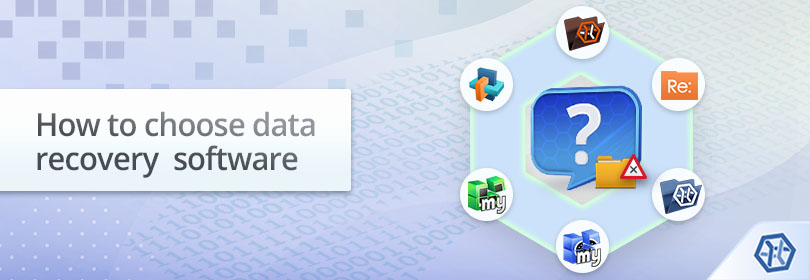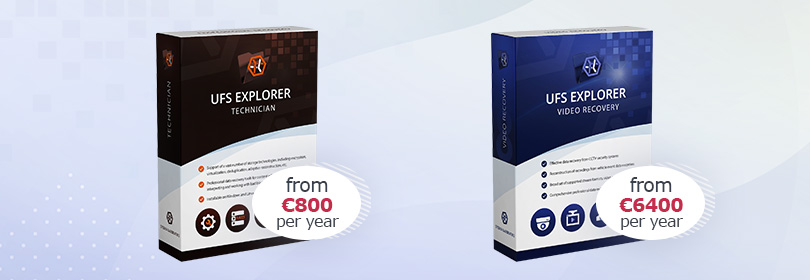How to choose software for data recovery or access to files

As a rule, data loss occurs at the worst possible moment, when a timely backup copy hasn’t been created. Important digital files can get removed by mistake, the operating system may encounter issues and suddenly refuse to boot, a storage medium may become corrupted or unintentionally formatted. Indeed, terrible coincidences take place sometimes, but, fortunately, these are normally resolvable situations. With the right software at your disposal, you can recover deleted or lost files, even without hiring professional services.
Note: Do-it-yourself data recovery is recommended only when a storage device remains operational. If there are any grounds to believe that it has any hardware issues, it is advisable to power it off immediately and contact reliable specialists, unless you have the respective expertise for manipulations with defective digital media.
The Software Store of SysDev Laboratories offers a wide variety of data recovery programs you can choose from. Each utility is designed to bring the missing files back, thus, at a first glance, they may look more or less similar. But the thing is that the real-world data loss scenarios have their specificities, and the requirements for the tools they get addressed with differ as well.
For instance, if you need to undelete some files from your USB stick or deal with some other trivial problems, you may opt for a simple multipurpose utility, and it will provide the same results in your case as a more advanced solution. The software itself will analyze storage for deleted files, and if necessary, perform a reconstruction of the damaged file system. You will just have to select a drive, launch a scanning procedure and copy the recovered items. This way, you can save a lot of efforts, as you won’t need to delve deeply into the details and parameters, along with costs for purchasing a much pricier tool.
On the other hand, work with some uncommon formats, storages consisting of multiple components or encrypted devices requires much more functionality than a low-end program can offer. Such cases may not be tackled by the above-mentioned generic solutions due to the lack of a certain instrument or support for a specific technology. However, this doesn’t mean that the data cannot be recovered at all. Under such circumstances, specialized utilities come to assistance. Their algorithms are adapted to the peculiarities of data organization on certain types of storages and, therefore, operate successfully in situations where other tools don’t even stand a chance.
A slightly different story is the use of data recovery software in a professional setting. Data recovery engineers know all the inns and outs of salvaging lost files and expect much more control over this process. They have to deal with various tasks from their clients, often very complicated ones, that may require more sophisticated instruments and modification of countless parameters. The utilities they employ usually include tools for the analysis of raw content and its manual editing. Moreover, some of them are aimed at processing storage devices with hardware problems and even offer integration with specialized data recovery hardware systems. All this allows them to achieve positive results even in the most hopeless scenarios. But whilst such features are extremely useful for specialists, it is not advisable to apply them without having the appropriate skills. Lack thereof may, vice versa, aggravate the consequences of data loss.
A different kind of software may be applied for the retrieval of undamaged data that cannot be opened due to certain issues. The most common cause for them is the incompatibility of several operating systems, resulting in a computer’s inability to recognize a “non-native storage”. Since such files were not deleted or lost, there is no need to perform their recovery. A data access utility can serve as a bridge to the inaccessible device or partition, enabling you to find the necessary items and save them to another location.
In practice, it may be quite hard to draw a line between these categories, since some programs bear the properties of both. But this rough division may generally make it easier for you to decide. Among the principal aspects you should consider for choosing the most suitable piece of software are:
- The type of storage medium affected by data loss. Simple storage devices, like internal and external hard disk drives, USB sticks, memory cards and similar storages can normally be processed with any multipurpose data recovery solution, unless they are wrapped into some sort of specific technology, like encryption, volume virtualization, data deduplication, etc. The latter can be employed either by the manufacturer by default or enabled by you during the setup/configuration procedure. If one of them is available on a storage, a more professional utility is usually required for data recovery, as they often have an intricate design that has to be “recreated” layer by layer. Different devices based on RAID, including DAS, NAS, SAN, servers, also constitute a separate instance of data loss and demand a specialized utility that features all the necessary RAID-related functionality.
- The type of file system your lost files belonged to. The file system is usually selected by the user or OS itself at the stage of storage formatting and plays a critical role in data recovery. The program has to be able to work with the applied format, otherwise, the process simply cannot be carried out. Most simple multipurpose utilities include the support for a basic set of file systems used in Windows, Linux and macOS. However, there are some not so common types, like ReFS of Microsoft, ZFS of FreeBSD or Btrfs of Linux that can be addressed by much fewer software options. Moreover, certain device vendors create proprietary file systems for their products. This is particularly commonplace for such appliances as surveillance CCTV units, NAS boxes and some driving recorders. That is why they usually require a dedicated specialized software solution.
- The type of files to be restored. As a rule, multifunctional data recovery tools are capable of retrieving files using metadata, regardless of the file type, and there is no necessity to get a separate application for each. Yet, in cases of serious data corruption, when certain intelligent reconstruction is to be performed, a specialized utility can provide much better results in comparison to a general-purpose one. Also, some file formats, like CCTV footages, cannot be previewed using the standard means of the operating system, but it is usually possible with dedicated data recovery software.
- Your level of computer literacy and skills in data recovery. Professional data recovery utilities generally cover the widest range of data loss issues and provide the most versatile functionality that allows dealing with complex storage systems, rare formats, serious data corruption and even failing digital media. Yet, due to the numerous features presented in them, inexperienced users may find it too difficult or even impossible to work with such software. In the main, beginners are encouraged to start with more simple tools that offer an easier way to solve their data-related problems. Entry-level solutions may even provide a Wizard-based procedure with helpful prompts aimed at resolving any doubts or concerns.
- The operating system you are going to use to retrieve the lost data. The program’s ability to recover data from the file systems of Windows, Linux or macOS doesn’t equal the possibility to run this software under each of these platforms. Hence, it is important to ensure that the application can be installed under the required operating system, and in case of cross-platform solutions – download the right installation option.
With these points in mind, let’s look more closely at each category and the software products falling under them:
Generic data recovery software
|
Problem: |
Accidental deletion of files, storage formatting, system malfunction, software crash, malware attack, etc. |
|
Type of storage: |
PC/laptop, USB flash drive, memory card, external hard drive, disk image, virtual disk, spanned volume (created with Apple’s Disk Utility, Linux LVM or mdadm, Windows Logical Disk Manager, etc.) |
|
File system: |
FAT/FAT32, exFAT, NTFS, ReFS/ReFS3 (Windows); HFS+, APFS (macOS); Ext2, Ext3, Ext4, XFS, Extended format XFS, JFS, ReiserFS, UFS, UFS2, Adaptec UFS, big-endian UFS, Sun ZFS, Btrfs (Linux) |
|
Type of files: |
Any existing file format |
|
Host operating system: |
Windows, macOS, Linux |
|
Level of skills: |
Basic, intermediate |
|
Price range: |
UFS Explorer Standard Recovery – from €59.95 Recovery Explorer Standard – from €39.95 Raise Data Recovery – from $34.95 |

Accidental deletion of an important project file or formatting of a drive with valuable databases is not a reason to panic as long as one has an effective data recovery tool. SysDev Laboratories has developed the standard editions of UFS Explorer and Recovery Explorer to cover the data recovery needs typical for home users and routine tasks technical experts solve on a day-to-day basis. Both utilities are cross-platform and deal with a broad set of storage devices, various file systems of Windows, Linux and macOS, along with virtual disks and disk image files. Their convenient interfaces, diverse auxiliary functionality and sophisticated algorithms enable a straightforward data recovery experience without compromising the efficiency of the procedure.
Hint: Here you can learn about the differences between UFS Explorer Standard Recovery and Recovery Explorer Standard.
Novice users can choose even a simpler tool for getting lost files back. Raise Data Recovery is a helpful must-have utility for beginners who seek out an efficient data recovery solution provided at an affordable cost. The program offers useful guidance for each step of the recovery process, so that it could be effortlessly performed by anyone. The application can be used to restore files from Windows, macOS and Linux or installed onto these operating systems under the same license. Its flexible licensing scheme also allows choosing between two support period options, making it possible to get short-time or prolonged access to the software updates.
Generic software for data loss from RAID
|
Problem: |
Accidental deletion of files, storage formatting, system malfunction, software crash, malware attack, etc. |
|
Type of storage: |
RAID (including nested and custom configurations, Btrfs-RAID, Synology Hybrid RAID, Drobo BeyondRAID*, ZFS RAID-Z*), RAID-based NAS, DAS, SAN, composite volume (Apple, mdadm, LVM, Windows Dynamic disk, Storage Space), encrypted drive (BitLocker, APFS) |
|
File system: |
FAT/FAT32, exFAT, NTFS, ReFS/ReFS3 (Windows); HFS+, APFS (macOS); Ext2, Ext3, Ext4, XFS, Extended format XFS, JFS, ReiserFS, UFS, UFS2, Adaptec UFS, big-endian UFS, Sun ZFS, Btrfs (Linux); simple/stripe ZFS volumes (BSD/Solaris) |
|
Type of files: |
Any existing file format |
|
Host operating system: |
Windows, macOS, Linux |
|
Level of skills: |
Intermediate, proficient |
|
Price range: |
UFS Explorer RAID Recovery – from €129.95 Recovery Explorer RAID – from €79.95 |

As the popularity of RAID-based devices, like NAS, grows, so does the demand for effective tools for the retrieval of files lost from such storages. Simple generic data recovery software can hardly manage any case of data loss from RAID, therefore, an extended application is needed for this purpose. The key feature of such software is the availability of instruments for recognition of RAID metadata, building RAID in the virtual mode, creating and modifying RAID configurations.
SysDev Laboratories offers the RAID editions of UFS Explorer and Recovery Explorer software for RAID-related data recovery tasks. The applications easily deal with general data recovery issues and are enhanced with a toolkit for work with RAID. UFS Explorer Network RAID is also available for cases of remote data recovery over LAN when it is impossible or inconvenient to connect the drives from RAID to a single computer. The utilities are cross-platform and can be installed on most common operating systems, including Windows, macOS and Linux.
Hint: Here you can learn about the differences between UFS Explorer RAID Recovery and Recovery Explorer RAID.
Professional data recovery software
|
Problem: |
Data loss due to severe logical damage, from a storage system implementing a specific technology, a virtual machine, an encrypted volume, a drive containing damaged sectors, a drive with non-standard sector size, etc. |
|
Type of storage: |
PC/laptop, USB flash drive, memory card, external hard drive, disk image, virtual disk, composite volume (Windows Dynamic disk, Storage Space, mdadm, LVM with thin provisioning, Core Storage, Fusion Drive), RAID (including nested and custom configurations, BeyondRAID, Brtrfs-RAID, RAID-Z, Synology Hybrid RAID), NAS, SAN, server, encrypted drive (BitLocker, FileVault 2, APFS, LUKS, TrueCrypt, VeraCrypt, eCryptFS), NTFS or ReFS volume with enabled data deduplication, defective or unstable drive |
|
File system: |
FAT/FAT32, exFAT, NTFS, ReFS/ReFS3 (Windows); HFS+, APFS (macOS); Ext2, Ext3, Ext4, XFS, Extended format XFS, JFS, ReiserFS, UFS, UFS2, Adaptec UFS, big-endian UFS, Btrfs, F2FS (Linux); ZFS (BSD/Solaris); VMFS, VMFS6 (VMware) |
|
Type of files: |
Any existing file format |
|
Host operating system: |
Windows, macOS, Linux |
|
Level of skills: |
Proficient |
|
Price range: |
UFS Explorer Professional Recovery – from €599.95 Recovery Explorer Professional – from €179.95 |

Professional data recovery software is an essential assistant for specialists in the field of data recovery and other proficient users of computers. Their daily routine requires having a comprehensive instrument for dealing with complicated cases of data loss. Normally, they choose advanced data recovery utilities featuring special tools for the work with complex or specific storage systems, encrypted volumes, virtualization technologies and failing digital media, for the analysis of data consistency and editing of hexadecimal content.
SysDev Laboratories offers the professional editions of UFS Explorer and Recovery Explorer to meet the high expectations of data recovery experts and tech-savvy home users. Both utilities are cross-platform and can be installed on most common operating systems, including Windows, macOS and Linux.
Hint: Here you can learn about the differences between UFS Explorer Professional Recovery and Recovery Explorer Professional.
For experts in digital forensics and other technical specialists
|
Problem: |
Data loss due to severe logical damage, from a storage system implementing a specific technology (including data carries of CCTV*, vehicle DVR appliances*), a virtual machine, an encrypted volume, a drive containing damaged sectors, a drive with non-standard sector size, etc.; the need to create a forensic report of the obtained data, view vendor-specific media files* and other issues |
|
Type of storage: |
PC/laptop, USB flash drive, memory card, external hard drive, disk image created with a professional forensic instrument (EnCase, FTK Imager and others), virtual disk, composite volume (Windows Dynamic disk, Storage Space, mdadm, LVM with thin provisioning, Core Storage, Fusion Drive), RAID (including nested and custom configurations, BeyondRAID, Brtrfs-RAID, RAID-Z, Synology Hybrid RAID), NAS, SAN, server, encrypted drive (BitLocker, FileVault 2, APFS, LUKS, TrueCrypt, VeraCrypt, eCryptFS), NTFS or ReFS volume with enabled data deduplication, defective or unstable drive |
|
File system: |
FAT/FAT32, exFAT, NTFS, ReFS/ReFS3 (Windows); HFS+, APFS (macOS); Ext2, Ext3, Ext4, XFS, Extended format XFS, JFS, ReiserFS, UFS, UFS2, Adaptec UFS, big-endian UFS, Btrfs (Linux); ZFS (BSD/Solaris); VMFS, VMFS6 (VMware); a vendor-specific CCTV or EDR file system (WFS, DHFS, HIK, Mirage, Pinetron, BKFL, NxFS and others)* |
|
Type of files: |
Any existing file format, various formats of video stream* |
|
Host operating system: |
Windows |
|
Level of skills: |
Proficient |
|
Price range: |
UFS Explorer Video Recovery – from €6400 per year UFS Explorer Technician – from €800 per year |
*Available only in UFS Explorer Video Recovery

In the majority of cases, computer forensics investigators and other IT professionals employ similar techniques to extract the information that has been deleted from a storage device or other way damaged. However, the tasks faced by such experts are sometimes even more complex, considering the fact that they may not be limited to the collection of the necessary data. The obtained evidence has to be preserved in accordance with all the field standards, in-depth analysis or proof of its credibility may also be required. Besides common digital media, they often have to deal with encrypted data carries, disk images created with specialized tools or specific storage formats, like ones of closed-circuit television appliances and event data recorders – the primary sources of video materials crucial for solving crimes, reconstruction of events that occurred during accidents and settling various disputes. Along with the need to process diverse technologies, incomplete or corrupt data may present another serious problem.
SysDev Laboratories offers the Video Recovery and Technician editions of UFS Explorer that are suited for the use in highly challenging data recovery tasks and respond to the requirements of experts in digital forensics and other technical personnel. Both utilities enable forensically sound retrieval of the data with the possibility of control over its integrity.
Specialized data recovery software
For data loss from NAS
|
Problem: |
Accidental deletion of files, storage formatting, issues with firmware updates, incorrect configuration, etc. |
|
Type of storage: |
Buffalo NAS, QNAP NAS, Synology NAS, Western Digital MyCloud NAS (the NAS unit can be booted) |
|
Type of files: |
Any existing file format |
|
Host operating system: |
Windows |
|
Level of skills: |
Basic, intermediate |
|
Price range: |
Network Storage Recovery for Buffalo NAS – from €99.95 Network Storage Recovery for QNAP NAS – from €99.95 Network Storage Recovery for Synology NAS – from €99.95 Network Storage Recovery for WD MyCloud NAS – from €99.95 |

With increasing utilization of network-attached storages in both big corporations and small home offices, there is a clear need for effective tools capable of restoring files lost from such devices. In the main, general data recovery software enhanced with RAID reconstruction functions is able to cope with data recovery from NAS, still, the lack of user’s technical skills together with the design peculiarities of some NAS models may make it impossible to disassemble the storage and connect its disks to the computer.
For cases when the NAS unit is bootable and its drives work properly, but taking them out of the box is impossible or undesired, SysDev Laboratories offers Network Storage Recovery – a set of vendor-specific utilities for recovering data directly from NAS boxes. Installable on Windows, the software supports most popular NAS devices, including ones produced by Buffalo, QNAP Systems, Synology, and Western Digital. As it restores data over a local area network, it doesn’t require removing the drives and connecting them to a PC.
For data loss from CCTV
|
Problem: |
Accidental deletion of footages, storage formatting, system malfunction, etc. |
|
Type of storage: |
Closed-circuit television appliances and data carriers they rely on (USB flash drives, memory cards, internal/external hard drives, etc.) |
|
Type of files: |
CCTV-footages |
|
Host operating system: |
Windows |
|
Level of skills: |
Basic, intermediate |
|
Price range: |
From €120.00 |

Surveillance camera security systems are one of the most popular technology solutions. They serve for the safety of homes and offices by monitoring what is happening inside/outside and preventing unauthorized access to the personal or corporate property. Although modern security cameras make surveillance simple and reliable, losing recorded videos or having issues recording them is a common problem which often occurs when those footages are urgently needed.
Owing to certain peculiarities of these systems, getting the missing recordings back requires purpose-specific data recovery software. SysDev Laboratories offers myCCTV Recovery as a special utility for recovery of video footages lost or deleted from closed-circuit television appliances. Installable on Windows, this helpful utility efficiently restores files from CCTV video and digital still cameras.
For data loss from dashboard cameras and other driving recorders
|
Problem: |
Accidental deletion of recordings, storage formatting, system malfunction, etc. |
|
Type of storage: |
Digital video recorders used in vehicles and data carriers they rely on (USB flash drives, memory cards, external hard drives, etc.) |
|
Type of files: |
DVR recordings |
|
Host operating system: |
Windows |
|
Level of skills: |
Basic, intermediate |
|
Price range: |
From €100.00 |

Automotive “black boxes” or dash cams provide crucial information for the reconstruction of accidents on the road. Losing this evidence may be critical in resolving controversial situations. Fortunately, footages lost from car camcorders can be retrieved with the help of purpose-specific data recovery software.
SysDev Laboratories offers myDriveRecorder Recovery – a special application for the recovery of data from driving recorders used in vehicles. Installable on Windows, this helpful utility quickly restores files lost from the black box of a vehicle.
For the recovery of photos
|
Problem: |
Accidental deletion of files, storage formatting, system malfunction, incompatibility issues, etc. |
|
Type of storage: |
PC/laptop, photo/video camera, memory card, USB flash drive, external hard drive, etc. |
|
Type of files: |
Original RAW photos |
|
File system: |
FAT/FAT32, exFAT, NTFS (Windows) HFS, HFS+, APFS (macOS), Ext2, Ext3, Ext4, UFS, XFS, ReiserFS, JFS (Linux) |
|
Host operating system: |
Windows |
|
Level of skills: |
Basic, intermediate |
|
Price range: |
From €29.95 |

When taking photographs of important moments in life or creating masterpieces with the help of a digital camera, one should be careful with storing these images. Accidental deletion of valuable photos or incorrect operations with an SD card where they are located often lead to the loss of the files. General data recovery software may successfully bring the lost photos back, however, file-specific data recovery utilities often provide users with much better results of recovery and even an option of reconstructing fragmented photos.
myPhoto Recovery is a software application developed by SysDev Laboratories for the restoration of digital photos. Enhanced with a special function of reconstructing a photo by matching its fragments, the software efficiently retrieves *.JPG-files lost or deleted from SD cards of photo and video cameras or any other storage medium.
Data access software
|
Problem: |
Lack of access to virtually stored files, OS incompatibility issues, unrecognized devices, etc. |
|
Type of storage: |
PC/laptop, USB flash drive, memory card, external hard drive, RAID, NAS, virtual machine, disk image. |
|
File system: |
FAT/FAT32, exFAT, NTFS, ReFS/ReFS3 (Windows); HFS+, APFS (macOS); Ext2, Ext3, Ext4, XFS, JFS (JFS2), ReiserFS, Btrfs (Linux); Unix/BSD UFS/UFS2, Solaris/Mac big-endian UFS/UFS2, Adaptec UFS, Sun ZFS, Btrfs, Novell NWFS, Novell Storage Services, DTFS, HTFS, VxFS, AIX JFS1/J2FS |
|
Host operating system: |
Windows |
|
Level of skills: |
Intermediate, proficient |
|
Price range: |
From €21.95 |

The issues with incompatibility of file systems or operating systems, especially in cases of dual-booting, often lead to inability to find or open a file. However, the fact that data cannot be found or accessed doesn’t mean that it is lost or removed. Thus, there is no need for a data recovery tool, as this problem can be easily solved by data access software.
SysDev Laboratories offers UFS Explorer Standard Access for opening storages that cannot be recognized by the local operating system and getting access to data located on supplementary operating systems. Installable on Windows, the software also provides access to multi-level virtual storages without the need to run a virtual machine. Please note that other editions of UFS Explorer along with the Recovery Explorer products already include the functions of this utility.
Note: Before purchasing the software, please, make sure that it corresponds to your data loss task. If you have any questions concerning the choice of the right software, please, feel free to contact our support team. Also, if you are unable to cope with the problem by yourself, you can always request remote professional services provided by the specialists from SysDev Laboratories.
Last update: October 11, 2023
